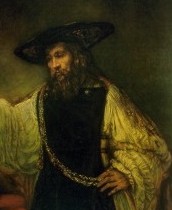| Tradition
of theological inquiry stemming from the Muslim philosopher Averroes,
or"Ibn Rushd," who mediated Aristotelian thought to Europe. |
 |
|
Rembrandt's
depiction of Aristotle
|
Contact with Muslims
in Spain and Sicily promoted a new acquaintance with the philosophy of
Aristotle in Europe where intellectual life for centuries had been heavily
dependent on platonism and neo-platonism.
Averroes (1126-1198) was among the most widely read of the Muslim interpreters
of Aristotle and was known throughout the middle ages as "the Commentator"
by reason of his commentaries on Aristotelian texts. The university of
Paris became the strongest center of
the new Aristotelianism and some of its theologians became known as "Latin
Averroists." The Averroists insisted on the independent use of reason.
On occasion this brought some of them into conflict with more traditional
theology. Some Averroists, for example, followed Aristotle in teaching
the eternity of matter, a doctrine which excluded creation in time. Siger
of Brabant (c. 1240-c. 1284) is a typical representative
of Latin Averroism.
|